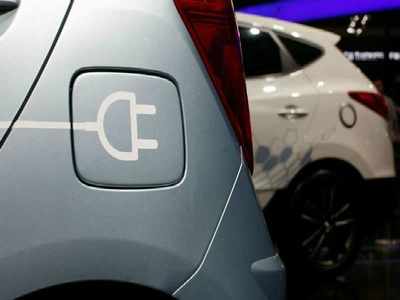- News
- Business News
- India Business News
- Auto companies, CII oppose early transition to e-vehicles
Trending
This story is from June 9, 2019
Auto companies, CII oppose early transition to e-vehicles

(Representative image)
NEW DELHI: The auto industry has hit out at the government for trying an early transition to electric vehicles, saying it will disrupt the pace of growth and hit business. The Society of Indian Automobile Manufacturers (Siam) received support from the broader industry association, CII (Confederation of Indian Industry) which said that mandating a particular technology, which as electric, should not be the only way to achieve green mobility.
The reaction of the industry comes at a time when there are reports that the government is looking to ban sales of petrol/diesel 3-wheelers by 2023 while planning to mandate electric in 2-wheelers for sub-150cc category by 2025.
CII, which is led by Vikram Kirloskar, said that "openness to all technologies with clear goals" should be the way forward, as it urged the government to be technology-agnostic in its approach.
"It will be constructive to allow multiple technologies as long as they are fuel efficient and meet standards of safety and quality," Kirloskar, who is also the vice-chairman of Toyota's Indian joint venture, said.
Wadhera, who is also the president of automotive business of Mahindra & Mahindra, said that it is not practical to apply "undue haste in banning mature automotive technologies" within the next 5-6 years in the hope that evolving electric technologies will fully replace the demand.
"Such unrealistic expectations and policies would only adversely affect the world's number 1 two/three-wheeler industry, but may not help in making electrics acceptable to the customer and the market," Wadhera said.
He claimed that the "backbone" of the auto industry, which includes the numerous component suppliers, will be impacted hard by any quick transition. "None of the stakeholders - industry, government nor the suppliers -- have any meaningful experience of electrics to even contemplate a 100% shift in 2/3 wheelers by 2023/2025," Wadhera said.
Any measure that accelerates the electric transition would lead to a policy-induced disruption that can result in significant damage to the auto industry and spell a big blow to the overall component ecosystem of micro, small & medium enterprises, with its related impact on employment.
"What is required is a well laid out roadmap for an ambitious electric roll out over a practical time-frame along with an integrated plan for setting up the necessary infrastructure across the length and breadth of the country," Wadhera said.
The reaction of the industry comes at a time when there are reports that the government is looking to ban sales of petrol/diesel 3-wheelers by 2023 while planning to mandate electric in 2-wheelers for sub-150cc category by 2025.
CII, which is led by Vikram Kirloskar, said that "openness to all technologies with clear goals" should be the way forward, as it urged the government to be technology-agnostic in its approach.
"It will be constructive to allow multiple technologies as long as they are fuel efficient and meet standards of safety and quality," Kirloskar, who is also the vice-chairman of Toyota's Indian joint venture, said.
Siam was direct in its attack in its opposition to any mandated transition to electrics as part of plans to drive clean technologies. "… the ambition needs to be tempered with a practical approach and what is possible without needlessly disrupting the automotive industry," Siam president Rajan Wadhera said.
Wadhera, who is also the president of automotive business of Mahindra & Mahindra, said that it is not practical to apply "undue haste in banning mature automotive technologies" within the next 5-6 years in the hope that evolving electric technologies will fully replace the demand.
"Such unrealistic expectations and policies would only adversely affect the world's number 1 two/three-wheeler industry, but may not help in making electrics acceptable to the customer and the market," Wadhera said.
He claimed that the "backbone" of the auto industry, which includes the numerous component suppliers, will be impacted hard by any quick transition. "None of the stakeholders - industry, government nor the suppliers -- have any meaningful experience of electrics to even contemplate a 100% shift in 2/3 wheelers by 2023/2025," Wadhera said.
Any measure that accelerates the electric transition would lead to a policy-induced disruption that can result in significant damage to the auto industry and spell a big blow to the overall component ecosystem of micro, small & medium enterprises, with its related impact on employment.
"What is required is a well laid out roadmap for an ambitious electric roll out over a practical time-frame along with an integrated plan for setting up the necessary infrastructure across the length and breadth of the country," Wadhera said.
End of Article
FOLLOW US ON SOCIAL MEDIA















